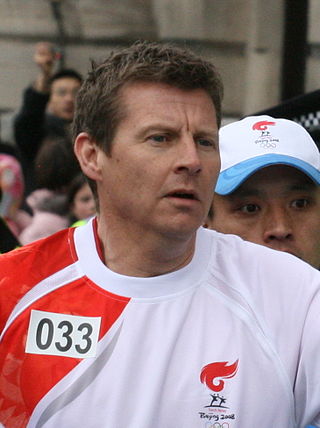
Stephen Cram, is a British retired track and field athlete. Along with fellow Britons Sebastian Coe and Steve Ovett, he was one of the world's dominant middle distance runners during the 1980s. Nicknamed "The Jarrow Arrow", after his home town, Cram set world records in the 1,500 m, 2,000 m, and the mile during a 19-day period in the summer of 1985. He was the first man to run 1,500 m under 3 minutes and 30 seconds. He won the 1,500 m gold medal at the 1983 World Championships and the 1,500 m silver medal at the 1984 Olympic Games.
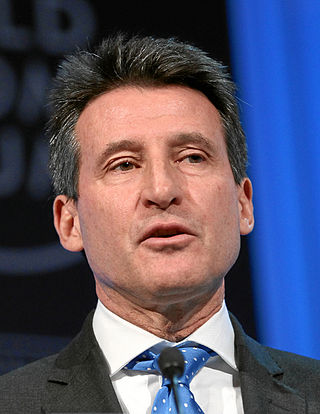
Sebastian Newbold Coe, Baron Coe,, often referred to as Seb Coe, is a British politician and former track and field athlete. As a middle-distance runner, Coe won four Olympic medals, including 1500 metres gold medals at the Olympic Games in 1980 and 1984. He set nine outdoor and three indoor world records in middle-distance track events – including, in 1979, setting three world records in the space of 41 days – and the world record he set in the 800 metres in 1981 remained unbroken until 1997. Coe's rivalries with fellow Britons Steve Ovett and Steve Cram dominated middle-distance racing for much of the 1980s.

Stephen Michael James Ovett, is a retired British track athlete. A middle-distance runner, he was the gold medalist in the 800 metres at the 1980 Olympic Games in Moscow, and set 5 world records for 1500 metres and the mile run and a world record at two miles. He won 45 consecutive 1500 and mile races from 1977 to 1980.

Olaf Beyer is a former East German 800 metres runner.
Thomas McKean is a British former middle-distance runner. He is a former world and European indoor 800 metres champion. Outdoors, McKean has medalled twice each at European and Commonwealth level.

Frank Emmelmann is a retired East German sprinter who specialized in the 100 and 200 metres.
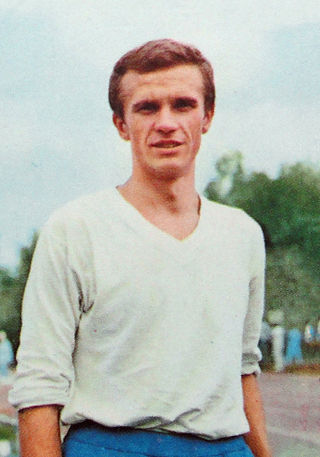
Jürgen Haase is a former track and field athlete and Olympian, who, competing for East Germany, was among the world's best long distance track runners in the 1960s and 1970s. Twice during this period, in 1966 and 1969, he was European champion in the 10,000 meters.
The men's 800 metres was an event at the 1980 Summer Olympics in Moscow, Soviet Union. There were a total number of 41 participating athletes from 28 nations, with six qualifying heats, three semifinals, and the final held on Saturday July 26, 1980. The maximum number of athletes per nation had been set at 3 since the 1930 Olympic Congress. The event was won by Steve Ovett of Great Britain, the nation's first gold medal in the men's 800 metres since winning four in a row from 1920 to 1932. It was Great Britain's sixth overall title in the event.

David Lekuta Rudisha, MBS is a Kenyan middle-distance runner who specialized in the 800 metres. He is a two-time back-to-back Olympic champion from the 2012 London and 2016 Rio Olympics, a two-time World champion from the 2011 and 2015 World Championships in Athletics, and world record holder at the event with a time of 1:40.91 set at the 2012 London Games on 9 August 2012. Rudisha is the first and only person to ever run 800 metres under 1:41, and he holds the three fastest, six of the eight fastest, and half of the twenty fastest times ever run in this event.
These are the official results of the Men's 800 metres event at the 1978 European Championships in Prague, Czechoslovakia. The final was held on 31 August 1978.
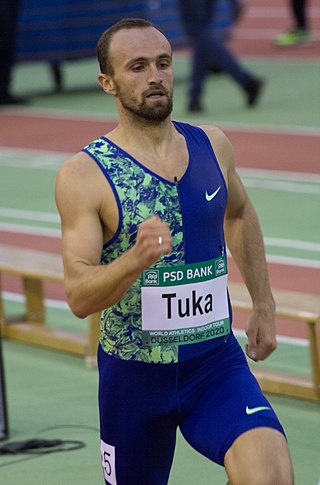
Amel Tuka is a Bosnian-Herzegovinian middle-distance runner who competes in the 800 metres. His achievements include a silver medal at the 2019 World Championships as well as a bronze medal at the 2015 World Championships. Tuka holds national records in the 400 m and 800 m disciplines. His personal best is 1:42.51 in the 800 metres.
Michael John Tagg is a British former long-distance runner. He finished second in the 10,000 metres at the 1969 European Championships.
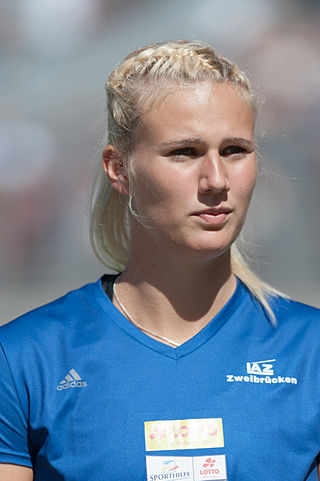
Christin Hussong is a German track and field athlete who competes in the javelin throw. She has won gold at the 2011 World Youth Championships, 2015 European U23 Championships and at the 2018 European Championships. Hussong holds the European Championships record with her personal best throw of 69.19 m.
Vladimir Vladimirovich Graudyn is a Russian former track and field athlete who competed in the 800 metres for the Soviet Union. He was a silver medallist at both the IAAF World Indoor Championships and European Athletics Indoor Championships in 1987.
Sergey Valentinovich Smirnov was a Russian track and field athlete who competed in the shot put. He was a medallist at the IAAF World Indoor Championships in 1987 and at the European Athletics Indoor Championships in 1986 and 1987. Smirnov represented the Soviet Union at the 1988 Seoul Olympics and at the 1983 World Championships in Athletics.
Angelika Zauber is a German former middle-distance runner who competed for East Germany in the 1500 metres and 3000 metres. She was the 3000 m gold medallist at the 1981 IAAF World Cup and the 1981 European Cup. She was a two-time national champion over 1500 m and set a best of 3:59.90 minutes at the competition.
Detlef Hugo Otto Uhlemann is a German former long-distance runner who competed for West Germany. Born in the Altenessen district of the city of Essen, he represented his country at the 1976 Summer Olympics, being a finalist in the 5000 metres. He was a member of the LG Bonn/Troisdorf athletics club during his career.
Hans-Jürgen Orthmann is a German former long-distance runner who competed for West Germany. He made thirteen consecutive appearances at the IAAF World Cross Country Championships from 1975 to 1987. His highest honour was a silver medal in 1980. He was a seven-time national champion, taking three titles in cross country running, two in road running and two in track.

Martina Steuk is a German former track and field athlete who represented East Germany. She competed in the 800 metres and occasionally the 400 metres.










